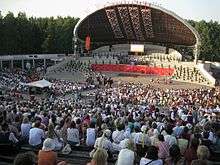Europeade

Europeade is the largest festival of European folk culture, held in a different European country each year. The last Europeade was held in Namur, Belgium in 2016.[1] The next will be in Turku, Finland in 2017.[2]
The first Europeade was held in 1964 at the initiative of Mon de Clopper (1922–1998) from Flanders and Robert Müller-Kox, a German exiled from the Province of Silesia. Mon de Clopper was president of the Europeade until 1997, when he was succeeded by the current president Bruno Peeters (born 1939), also from Flanders.
The goal of the Europeade is to foster a united Europe, where everyone contributes and develops his or her own culture, respecting everyone else. This philosophy is practised each year during the five-day festival, when thousands of people from all parts of Europe, dressed in their traditional costumes, meet to sing, to make music, to dance and to celebrate - without formal lecturing.
In a typical Europeade there are about five thousand participants, all in costume, in almost two hundred groups, from about twenty-two countries. They all pay their own transport costs, and perform free of charge. Participants arrive during the Wednesday, and are accommodated in large premises wherever possible, typically in large schools, with basic beds supplied in the class-rooms, and using other school amenities. Large-scale catering is provided, usually a simple breakfast, a packed lunch and a hot evening meal in one central location. Groups perform in a number of large concerts, in designated street locations, and take part in a massed parade through the town and in a major Saturday evening Europeade Ball. Outside the actual events many groups will sing, play and dance wherever they happen to find themselves, including the premises where they are lodged. After the Sunday afternoon Closing Concert - typically ninety groups performing - groups are free to make their way home, but accommodation continues until after breakfast on the Monday morning.
Cities where the Europeade was held
- 1964 Antwerp, Belgium
- 1965 Dortmund, Germany
- 1966 Antwerp, Belgium
- 1967 Valencia, Spain
- 1968 Antwerp, Belgium
- 1969 Marche-en-Famenne, Belgium
- 1970 Herzogenaurach, Germany
- 1971 Antwerp, Belgium
- 1972 Annecy, France
- 1973 Nuoro, Italy
- 1974 Antwerp, Belgium
- 1975 Marbella, Spain
- 1976 Annecy, France
- 1977 Nuoro, Italy
- 1978 Vienna, Austria
- 1979 Antwerp, Belgium
- 1980 Schwalmstadt, Germany
- 1981 Martigny, Switzerland
- 1982 Gijon, Spain
- 1983 Vienna, Austria
- 1984 Rennes, France
- 1985 Turin, Italy
- 1986 Figueira da Foz, Portugal
- 1987 Munich, Germany
- 1988 Antwerp, Belgium
- 1989 Libourne, France
- 1990 Valladolid, Spain
- 1991 Rennes, France
- 1992 Figueira da Foz, Portugal
- 1993 Horsens, Denmark
- 1994 Frankenberg, Germany
- 1995 Valencia, Spain
- 1996 Turin, Italy
- 1997 Martigny, Switzerland
- 1998 Rennes, France
- 1999 Bayreuth, Germany
- 2000 Horsens, Denmark
- 2001 Zamora, Spain
- 2002 Antwerp, Belgium
- 2003 Nuoro, Italy
- 2004 Riga, Latvia. A monument in Riga commemorates this Europeade. It was donated by cities that hosted the Europeade before, on the occasion of the first Europeade in the Baltic States and in a former Soviet republic.
- 2005 Quimper, France
- 2006 Zamora, Spain
- 2007 Horsens, Denmark
- 2008 Martigny, Switzerland
- 2009 Klaipėda Lithuania
- 2010 Bolzano, Italy
- 2011 Tartu, Estonia
- 2012 Padua, Italy
- 2013 Gotha, Germany
- 2014 Kielce, Poland
- 2015 Helsingborg, Sweden
- 2016 Namur, Belgium
Participation by country
For the Europeade 2008 in Martigny (Switzerland) some two hundred groups registered. Their countries of origin were as follows:
- 27 groups from Germany
- 26 groups from Spain and Belgium
- 16 groups from Latvia
- 15 groups from each Estonia, France and Italy
- 10 groups from Hungary
- 9 groups from Lithuania
- 8 groups from the Czech Republic
- 7 groups from Portugal
- 5 groups from Denmark
- 3 groups from each Ireland, The Netherlands, Romania and Sweden
- two groups from each Bulgaria, Cyprus, Finland, Greece and the United Kingdom
- one group from each Armenia, Austria, Georgia, Greenland and Luxembourg
- also the host country Switzerland was represented by only one group
- there were no groups from Iceland, Norway, Poland, Slovakia and Former Yugoslavia, despite the strong folk tradition of those countries.
For the Europeade 2011 in Tartu (Estonia) over hundred groups registered. Their countries of origin were as follows:
- 34 groups from Estonia
- 21 groups from Latvia
- 13 groups from Finland
- 12 groups from Germany
- 8 groups from each Italy and Belgium
- 5 groups from each Lithuania and Czech Republic
- 3 groups from each Spain, Ireland, Portugal, Sweden and Turkey
- 2 groups from each Slovakia, Cyprus and Denmark
- 1 group from each Austria, Switzerland, France, Greenland, Hungary, Netherlands, Norway, Russia, Slovenia and United Kingdom
- there were no groups from Iceland, Belarus, Poland, Ukraine and Moldova, despite the strong folk tradition of those countries.
| Wikimedia Commons has media related to Europeade. |
References
Sources
- Europeade Website
- Europeade 2008 Martigny, Switzerland
- Europeade 2009 Klaipėda, Lithuania
- Europeade 2011 Tartu, Estonia
- Europeade 2015, Helsingborg, Sweden
